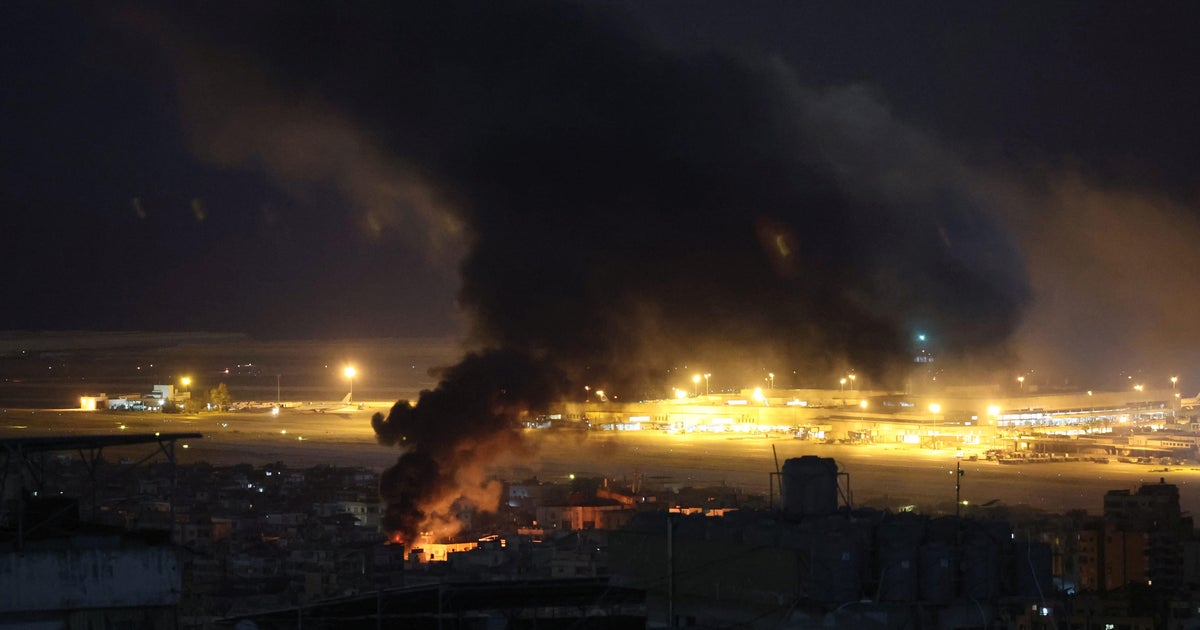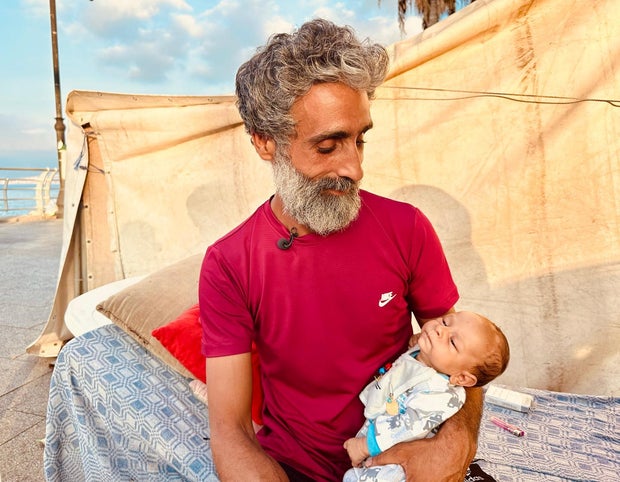A fresh wave of Israeli airstrikes started pounding locations across Lebanon on Sunday night, some striking dangerously close to Lebanon’s only international airport. Israel had said it would launch a widescale assault on a banking institution it regards as Hezbollah’s de-facto financial arm, the Al-Qard Al-Hassan Association.
The strikes began a day after a drone targeted Israeli Prime Minister Benjamin Netanyahu private residence in the central town of Caesarea. He and his wife weren’t there at the time and there were no casualties, but Netanyahu released a statement on Saturday saying, “the attempt by Iran’s proxy Hezbollah to assassinate me and my wife today was a grave mistake.”
Sunday night, explosions rocked Beirut as the Israeli strikes targeting Al-Qard al-Hassan began.
Ugur Yildirim/dia images/Getty
The Israel Defense Forces said in a statement Monday morning that the institution “directly funds Hezbollah’s terror activities, including the purchase weapons and payments to operatives.” The IDF said the Iran-backed, U.S. and Israeli-designated terrorist group has “billions of dollars” stored in its branches across Lebanon, “including money that was directly held under the name of the terrorist organization.”
The IDF said its strikes hit Al-Qard al-Hassan targets in the capital Beirut, in southern Lebanon, and “deep within Lebanese territory,” in addition to ongoing strikes in the south that it said had hit 15 Hezbollah missile launchers that were targeting “the communities of northern Israel.”
The IDF said “numerous steps were taken to mitigate the risk of harming civilians, including advance warnings issued via different platforms to the civilian population in the area.”
But with every new strike, already-overwhelmed hospitals are put under even greater pressure, and more people are forced to flee their homes. Lebanese officials say 1.2 million people across the country have been displaced by war that escalated sharply one month ago, with the beginning of the intense Israeli airstrikes.
Anger and fear for the future grips Lebanese civilians
Displaced Lebanese civilians have set up makeshift shelters wherever they can find a patch of ground they believe will be safe.
CBS News met Hussein Hamieh holding his tiny son, just over a month old, outside the tent he’d pitched along Beirut’s popular beachfront. He fled his home in Beirut’s southern suburbs, an area long considered a Hezbollah stronghold, which has come under repeated attack since mid-September.
The ongoing strikes have only hardened his resolve, and his anger.
“I had to flee because we are dealing with a merciless enemy,” Hamieh said. “They fire rockets at us, I was forced to leave my home.”
CBS News/Agnes Reau
“We will win, and as long as we live in our country, we will have victory,” he told CBS News. “We will endure famine, rain, the sea or snow, and we can live under the trees, but we won’t leave our land.”
Beirut resident and artist Mona Jabour said she was worried about the long-term damage this war would inflict on everyone in the country, especially younger generations.
“People are going through hell,” she said. “Everything is crumbling under our feet… It’s just a disaster to see that young people are being brought up on violence and wars, and this is going to perpetuate new hatred, new wars.”
“These kind of wars, in 2024, should not even be allowed,” she told CBS News. “They are bombing each other, and these wars cost a lot — the money spent on arms could be spent a lot more wisely and constructively, to educate, to build homes, to improve third-world nations, to create more safety. I think people should wake up to the harm that is being done.”
CBS News/Agnes Reau
Netanyahu’s government launched its assault on Hezbollah in September, saying it would continue until the group was no longer able to launch rockets and drones across Lebanon’s southern border at Israeli communities. Hezbollah has launched well over 10,000 weapons at Israel in support of Hamas, its Iranian-backed ally in the war-torn Gaza Strip, over the last year.
U.S. sends Israel missile defense system, tries to “dial down the tensions”
Most of those Hezbollah rockets and drones are shot down by Israel’s missile defense systems, and Iran itself has also launched two ballistic missile salvos at Israel over the last year in response to the assassination of its senior commanders and allies. The region has been on tenterhooks since Netanyahu vowed to make Iran pay for the last missile attack on Oct. 1, which didn’t cause any casualties.
In anticipation of Israel’s looming response — and any potential Iranian counter-response — the U.S. has sent Israel a new missile defense system. U.S. Secretary of Defense Lloyd Austin said Monday that the Terminal High Altitude Area Defense (THAAD) system had arrived in Israel, along with a small contingent of about 100 American troops.
“We have the ability to put it into operation very quickly,” Austin said during a visit to Ukraine’s capital.
The Biden administration has made it clear that it would not support an Israeli counterattack that targeted Iran’s nuclear facilities or oil infrastructure, but Austin indicated Monday that Washington was still unsure exactly how far Netanyahu’s government would go.
“It’s hard to say exactly what that (Israeli) strike will look like,” he said. “At the end of the day, that’s an Israeli decision, and whether or not the Israelis believe it’s proportional and how the Iranians perceive it, I mean those may be two different things.”
Austin said the U.S. would “continue to do everything we can… to dial down the tensions and hopefully get both parties to begin to deescalate.”
As part of those ongoing efforts to halt the escalating tit-for-tat between Israel and Iran’s proxy groups in Lebanon and Gaza, senior White House envoy Amos Hochstein was in Beirut Monday to meet with Lebanon’s care-taker prime minister and the speaker of the country’s parliament, a Hezbollah-allied lawmaker who’s negotiated on behalf of the group.
A U.S. official told CBS News that Hochstein would be “pursuing an enduring arrangement that will bring a durable end to the conflict.”
contributed to this report.





